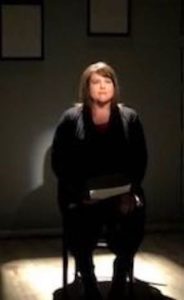
 [rating=2]Originally written in Bulgarian—and for the first time presented in English—”Sunday Evening” by Zachary Karabashliev is a deep, dark tragedy about marriage, career, and the meaning of personal liberty peppered with coarse comedic and vulgar references. It is a story about conflict and about being conflicted. Though the drama is penetrating, its elements are too scattered, and the play doesn’t gel as it should. Cultural differences aside, it was a hard performance to critique in more ways than one.
[rating=2]Originally written in Bulgarian—and for the first time presented in English—”Sunday Evening” by Zachary Karabashliev is a deep, dark tragedy about marriage, career, and the meaning of personal liberty peppered with coarse comedic and vulgar references. It is a story about conflict and about being conflicted. Though the drama is penetrating, its elements are too scattered, and the play doesn’t gel as it should. Cultural differences aside, it was a hard performance to critique in more ways than one.
Marital troubles plague Nick (Logan Hulick) and Rose (Rachel Sepiashvili), who viciously argue in front of their best friend and confidante Stella (Maria Margaglione). We have no idea how and why Stella has become so close to the couple, such that they bar the door to prevent her from leaving and bribe her with cups of strong coffee—and insist that she remain in their house to watch them fight. But why do they encourage her to take on the role of voyeur? Could it be because later on, we see that Stella needs some excuse not to return to her own house and her own dysfunctional family? We begin to wonder, then, whether Stella’s character is being used as a foil, as the necessary third person in the room—so we can hear directly from Nick what he doesn’t like about Rose, and from Rose what she doesn’t like about Nick. Through their group interaction, we learn that Rose has received a set of love letters from a man in Baghdad, and Nick is deeply hurt and resentful of her seeming infidelity. Yet how many times do we have to see a couple fighting or, for that matter, sexually aroused? What is most bizarre is that the scene keeps returning to this odd dynamic of three, making the presentation too long and repetitive.
Nick, Rose, and Stella each want to cling to their romanticized versions of the past, that is, good feelings, remembrances, and hopefulness of earlier days. Nick, for example, says that he loves Rose the way she used to be; she tells him bluntly that she is not the same person. Simultaneously, theatre and movie fans are apparently in love with the Stella of the past, whose acting career ultimately didn’t go anywhere, because she took a long break to raise her daughter Jenny (Melanie McNulty). But Stella—her name, of course, meaning star—now thinks about going to New York to become an actress again.
Despite the fact that the three main characters would prefer to go back in time, they undeniably know that things have changed in the interim. The disconnect between their past expectations for the future and present-day reality may be causing Nick to drink to excess (but maybe he did so beforehand; we don’t know this). The same impulse might be responsible for Rose taking antidepressants like Paxil and Zoloft as a means of coping with Nick’s abusive behavior and her disappointment in not pursuing her chosen career as a fine artist. Add these circumstances to other pressures, such as the immigrant experience of adjusting to America (and the presumed differences in culture and behavior from that of Eastern Europe) with the realities that their children are growing, that each of them is not getting any younger, and that career goals have changed with the need for money, then life begins to look less like a melting pot and more like a pressure cooker.
Much is made about the Statue of Liberty being a symbol of yearning for a better life abroad. But then we learn that all of them have already emigrated to the U.S.A. and now live in sunny and warm Southern California. Nick and Rose have a young son named Sammy; and Stella lives with her husband Frank, a noted psychiatry professor, and her daughter Jenny, who attends film school at UCLA.
In addition to the ample bright sunny days, there are, of course, the rare and miserable rainy days. These present the occasion for everybody and their brother to order in pizzas, because nobody wants to travel outside to a restaurant or cook outdoors on their grill. Rose says more than once that pizza is the most common thing that Death Row inmates order as a last meal before their execution. On this particular Sunday evening, marred by steady rain, the group happens to phone in a pizza for delivery. This becomes the spur for much of the action that follows, a good portion of which becomes rather silly—often to the point of not ringing true—and detracts us from the more serious message behind the performance.
Only later in the play does the audience learn that Stella is supposed to be the protagonist, not just play a supporting role. This makes the gist of the story confusing and consequently splits the narrative arc into two: the Stella tale versus the Nick and Rose tale. While the underlying thread is still there, the overall plot is now frayed and only forcibly comes together at the end. More confusion is introduced with the flashbacks and flashforwards, apparently interspersed with some glimpses of the afterlife that doubles as live theatre. Unfortunately, this nonlinear approach proves unsuccessful in getting into the mind of any one of the characters—as the most important changes in personality and insight appear to take place not on stage but between scenes. Instead of creating a fluid impressionistic way of viewing family dynamics, the pacing becomes off—and what is foretold is the troubling message that death is the best escape from unhappiness: It is only the true path to freedom, and we don’t realize this while we are still alive. Comic elements lighten up the show, but the boundary between tragedy and comedy is elusive. Whatever dark comedy there is seems to be overdone—or not in keeping with the larger dramatic theme. Certain tragic aspects are sometimes so bad that they are funny. Was this the intention of the playwright in the first place?
 One of the more impactful subplots is learning that Jenny has probably endured sexual abuse at the hands of her stepfather, who, as a professor of psychiatry, can claim she is delusional and thus needs to be medicated or institutionalized. When Stella is confronted by her daughter’s accusations, she cannot process these. Without being there in person to witness these alleged events, she finds herself lost. Does she take the side of her husband (and with it, his belief that their daughter is mentally ill), or does she believe her daughter’s story and side with her against her husband?
One of the more impactful subplots is learning that Jenny has probably endured sexual abuse at the hands of her stepfather, who, as a professor of psychiatry, can claim she is delusional and thus needs to be medicated or institutionalized. When Stella is confronted by her daughter’s accusations, she cannot process these. Without being there in person to witness these alleged events, she finds herself lost. Does she take the side of her husband (and with it, his belief that their daughter is mentally ill), or does she believe her daughter’s story and side with her against her husband?
Being so tightly focused on previous narratives of how loved ones have responded or acted in the past makes each character fail to notice everchanging tides in their own personality and that of others. But all things can change. Although Nick and Rose have lashed out at each other in mean-spirited and horrific ways, they eventually transform their lives and integrate a new way of dealing with each other. But when Stella’s points of reference are obliterated in the face of rapidly changing circumstances, it becomes nearly impossible for her to adjust. Lacking the means for expressing deep feelings and addressing conflicting emotions, she cannot rewrite her autobiography quickly enough to explain her new situation to her old self. The question is at what point can she adequately internalize her situation, comprehend her likely alternatives, and master the lesson of reinventing herself, such that she can best withstand the emotional tolls of daily living.
A spirited and meaningful international drama, “Sunday Evening” is directed by Zlatomir Moldovanski, artistic director of the Rose Valley Theatre Group. The play won an Askeer, the most respected theater award in Bulgaria, in 2009 for “Best New Bulgarian Play.”
Rose Valley Theatre Group’s Inaugural Production of “Sunday Evening” is playing through February 9, 2020, at the Upstairs Studio of the Greenhouse Theater Center, 2257 N. Lincoln Avenue, Chicago.
Performances are Thursdays through Saturdays at 7:30 p.m. and Sundays at 2:30 p.m.
Tickets are $30 – $35 and are available at www.greenhousetheater.org. For more information on the production, go to http://magurabcs.com/Sunday-Evening.
To see what others are saying, visit www.theatreinchicago.com, go to Review Round-Up and click at “Sunday Evening”.






More Stories
“Dummy in Diaspora”
“The Magic School Bus: Lost in the Solar System”
“February House” reviewed by Julia W. Rath